Democratic Climate Action Plan
Air Date: Week of July 10, 2020
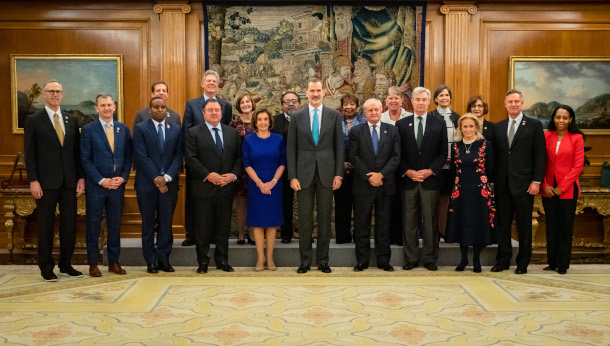
After more than a year of consideration, the House Select Committee on the Climate Crisis have introduced a massive climate action plan. Here, members of the Committee are pictured, alongside Speaker Nancy Pelosi at the 2019 United Nations Climate Change Conference (Photo: John Brighenti, Flickr, CC BY 2.0)
After more than a year of consideration, the members of the House Select Committee on the Climate Crisis have released a massive climate action plan that aims to end carbon pollution and build new clean energy and transportation systems, while also helping communities adapt to climate disruption. Select Committee on the Climate Crisis Chair Kathy Castor (D-FL) joins Host Steve Curwood to discuss what the plan means for environmental policy and environmental justice communities moving forward.
Transcript
CURWOOD: From PRX and the Jennifer and Ted Stanley Studios at the University of Massachusetts Boston, this is Living on Earth. I’m Steve Curwood.
After more than a year of consideration, the Democratic majority members of the House Select Committee on the Climate Crisis have come up with a massive, 538-page plan for climate action. Their report pinpoints hundreds of measures to end carbon pollution and protect public health with climate-friendly economic, transportation and energy systems, and an end to subsidies for fossil fuels. With a focus on environmental justice, their plans call for conserving public lands, farmland and forests to lock up carbon, and also helping communities adapt to climate disruption. The chair of the Climate Crisis Committee, Kathy Castor of Florida joins us now from the Capitol. Welcome back to Living on Earth!
CASTOR: Thank you so much, Steve.
CURWOOD: So first, how does it feel to finally be able to release this report to the Congress?
CASTOR: Well, I'm especially excited to be with you because I spoke with you at the outset, over a year ago, when Speaker Pelosi and the Democrats in Congress directed the establishment of a new Select Committee on the Climate Crisis and tasked us with talking to stakeholders all across the country, every political persuasion, folks really at the grassroots and develop solutions for the Congress. They directed us to be ambitious, and we've delivered an ambitious report.
CURWOOD: Well, talk to me about some priorities. It's, it's kind of like you have 10 hungry children, you love them all. But you have limited resources. How do you set priorities? What's your top priority here?
CASTOR: The top priority is the clean energy economy. The plan says we have to decarbonize American society by the year 2050, but in the various sectors of the economy, we propose, we've got to act a lot faster. And the one that is the top priority really will be establishing a clean energy standard to clean up our grid no later than 2040. So that means we've got to get to work right away to do that. The other top priority is the transportation sector because now there are more emissions coming out of the transportation sector than even the power sector. So we propose clean electric vehicles and set a goal of all new cars to be clean electric vehicles no later than 2035.
CURWOOD: How is this plan going to advance environmental justice and systemic racism?
CASTOR: As you know, there are many communities across America that have carried the burden for entirely too long. They're the communities where the industrial plants are sited in their neighborhoods, time after time. You know, we consulted all across the country and I remember a trip to Detroit, Michigan where I talked to environmental justice leaders. And even before the murder of George Floyd, we were focused on building our climate action plan upon a foundation of environmental justice and fair labor standards for workers. So environmental justice recommendations are embedded throughout our report. For example, the Environmental Protection Agency, when they make permitting decisions or they are trying to determine where to deploy community clean energy resources, community solar, we say that our environmental justice communities must come first.
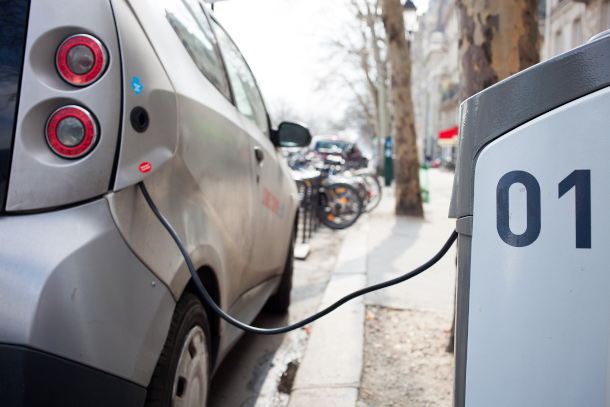
Electric vehicles are central to the House Select Committee on the Climate Crisis’ plan, which aims for all new cars to be electric by 2035. (Photo: Håkan Dahlström, Flickr, CC BY 2.0)
CURWOOD: Congresswoman, the climatologists are talking about this being possibly the warmest year on record. With searing heat waves this summer, there will be air conditioning bills that some won't be able to afford. How does, how does this moment relate to the need to address the climate and equity?
CASTOR: It's interesting that you mention that because my hometown of Tampa, Florida just last week set an all time high temperature record, they broke through to 99 degrees. And in Miami, they haven't really been able to cool off at night. So this is real to people. And you're right, the electric bills are going to be astronomical. So this is part of the, the cost. And I think, in the past, the opponents of climate action have often argued, "it's too expensive for us to act on climate, it's too expensive to make these changes." People don't believe that anymore because they know, they are paying those higher air conditioning bills or property insurance or flood insurance bills or for your stormwater fees. So this is a plan that will benefit all of us, by reducing greenhouse gases and moving to the clean energy economy, that will benefit all of us. Rebuilding better, rebuilding in a more resilient way, giving our local communities the tools they need to prevent flooding, to be sure they're ready for the more intense hurricanes, to be able to handle the wildfires. There are extensive recommendations on how the federal government can be a better partner to communities all across the country.
CURWOOD: Of course, with the COVID recession, there have been and there are going to be more stimulus bills, Congress is going to put forth money to help rebuild the economy. What does your report tell us how we should rebuild the economy in the wake of this COVID recession?
CASTOR: This is a, an enormous opportunity for America to rebuild better. We had an independent think tank look at our plan and model it out. And not only do we get about 90% of the way towards reducing emissions by 2050, they say that we'll create over 500,000 jobs as we transition to the clean energy economy. We will save 62,000 lives annually if we move to the clean energy economy. But it's the jobs focus that is particularly important at this moment in time because we have 40 million Americans who are out of work now. And we think that there is an exciting pathway for folks to go to work, building the macro grid, the super grid that we'll need to connect renewable power sources, solar and wind. These are the jobs in making our communities more resilient. We propose reinvigorating the Civilian Conservation Corps, which was a President FDR idea back in the Great Depression. We propose a new Climate Resiliency Corps to help communities, especially environmental justice communities, do things to make, handle extreme heat, like planting trees in, in formerly redlined neighborhoods or helping with natural solutions -- reinvigorating, you know, turning our public lands into places that aren't exploited for mining and, and fossil fuel development, but are places we can capture carbon. You know, a lot of places all across the globe are already planning these kind of recovery plans. And we see an exciting opportunity for America to do so as well.
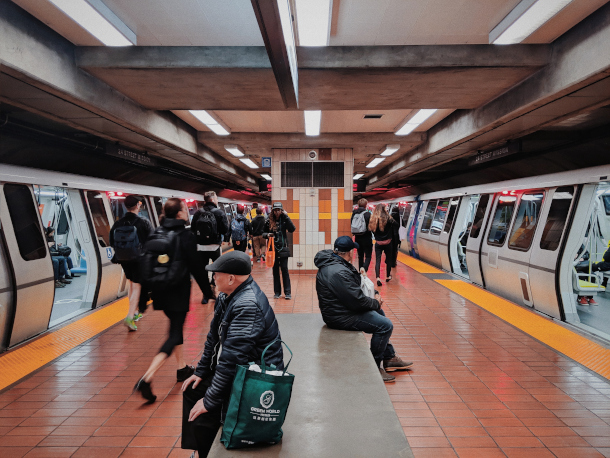
The House Select Committee on the Climate Crisis’ plan would divert funding to more efficient public transportation. (Photo: Vinicius Depizzol, Flickr, CC BY 2.0)
CURWOOD: Now, you mention that the plan calls for a national supergrid using high voltage direct current transmission as opposed to the three big grids we have right now in America, right? We have an East, and we have a West, and we have Texas. And if you did that, right, it would make it possible for us to be 80% renewable with, with the balance of the baseload being handled by existing nuclear. Okay, great idea. But how heavy a lift is this going to be, do you think, to implement a nationwide high voltage DC grid? There's money questions; there's rights of way questions.
CASTOR: You bet. But this is a top priority. Because most, most folks aren't aware that most renewable resources -- this, big solar arrays and wind power -- most of those resources exist between the Rocky Mountains and the Mississippi River. So that has to be our goal, to connect those less expensive renewable resources to population centers across the country. We recommend investing in research and development into storage of these resources. We recommend significant investment in energy efficiency, which pays dividends; if you can help businesses and consumers save on their electric bills, that's a plus. We have to do all of these things and you know, our task is urgent. So here's some good news. Just this week, the House Democrats passed a major transportation and infrastructure bill, the Moving Forward Act, HR 2. And a lot of the Select committee's Solving the Climate Crisis recommendations are contained in that transportation and infrastructure bill. So we, we're already getting started on the infrastructure planning for the transmission supergrid, or macro grid.
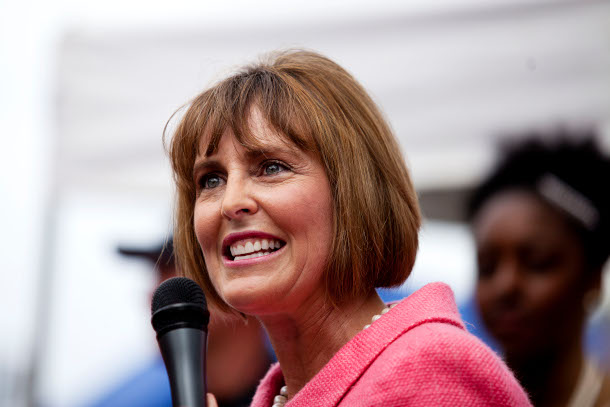
Florida Congressional Representative Kathy Castor, chair of the Climate Crisis Committee, speaks at a Planned Parenthood Rally on August 29, 2012. (Photo: PBS NewsHour Follow, Flickr, CC BY 2.0)
CURWOOD: By the way, the plan talks about a lot of resources getting promised to the fossil fuel industry for carbon capture and storage. But look, 25 years after that technology was first proposed and some pilot efforts mounted it has yet to become cost effective. Why should taxpayers keep spending money on this?
CASTOR: No, taxpayers should not keep spending money on that. We recommend that any of the tax incentives and appropriations that go to fossil fuel, that they are ended over time and shifted to clean energy resources. And in fact, the Moving Forward Act that passed the House of Representatives this week, extends a lot of our clean energy tax credits. Our report says for carbon capture and storage, if an industry proposes to use it, and they're going to increase their carbon footprint, that won't be allowed. We, we recommend that there have to be some climate guardrails. We also believe that there are some industries out there, where there are no solutions right now in how to capture their carbon, meaning, steel, the way we make cement, and other industrial processes. And we think that that type of carbon capture and storage could be an important solution. But we have to, we have to develop the technology that doesn't exist right now.
CURWOOD: And oh, by the way, the report calls for protecting at least 30% of all US lands and ocean areas by 2030. Kind of sounds to me a bit like what Tom Udall over on the Senate side has been saying for a while. Where are we now on meeting that goal and how do we get to 30% by 2030? And why is this so important for the climate?
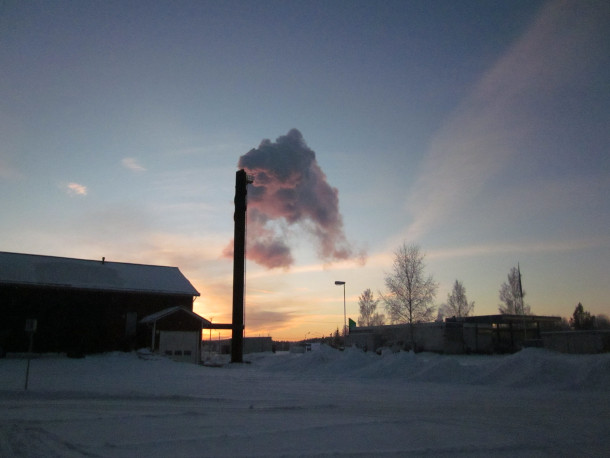
The House Select Committee on the Climate Crisis’ plan focuses on curbing U.S. carbon emissions by 2050. (Photo: Bubblejewel96, Flickr, CC BY 2.0)
CASTOR: Vitally important to the climate that we do not continue to exploit our public lands and offshore waters. In fact, they can really be drivers of carbon solutions, whether that's sequestering carbon or preventing the overdevelopment of our farmlands and protected spaces. People love our national park systems, they love the natural wilderness areas. But we need to understand that they are vital to carbon sequestration and climate action. There's a lot of extraction allowed on our public lands right now; we think over time, that needs to come to an end, and we need to make a broad based commitment to protecting those public spaces.
CURWOOD: That's right, there's almost 500 gigatons of carbon just in America's public lands. How did your committee's on-site field visits help inform this report? You talked about environmental justice in one case, but which other ones specifically were most informative and enlightening?
CASTOR: Yeah, I traveled to the Hampton Roads area with Congresswoman Elaine Luria, we visited a military installation in Norfolk that is dealing with the cost of rising sea levels. We also went with her and Congressman Don McEachin out to an area that floods repeatedly and they're having to relocate some neighborhoods there; that was impactful. And then just up the road, Congressman Bobby Scott took me to a neighborhood that also repeatedly floods. It's a lower income neighborhood. And the folks there told me they don't want to leave when it floods, that's their home. All of that helped influence our recommendations on flood mapping and how we make flood insurance more affordable to people, how we empower communities to understand what the climate risks are going to be in the future so they can make determinations where they're going to buy a home, where they're going to live, and empower the local communities to develop some resiliency plans, some adaptation plans over time. Traveling to Motor City in Detroit and meeting with Ford and GM and then with a lot of the auto workers was inspiring because they're already on track to transition over to the clean electric vehicles. They see it as a significant competitiveness issue with China and the European Union. And that inspired us to push hard when it comes to electric vehicles. We think we can be the world leader when it comes to manufacturing the clean cars and trucks. We went to California, Southern California where they're building the clean electric buses. We envision a future that's not too far off where every child in America who has to ride a bus to school, it's going to be a clean electric bus, and that's going to provide tremendous benefits to the air our kids breathe, too. You got me on a roll here [LAUGHS] -- I wish in the COVID days we could travel, but we're not going to be able to do that. We're going to do a lot of this virtually. But I'm excited to amplify the recommendations in our report and keep listening to folks all across this diverse country as we move our recommendations into law.
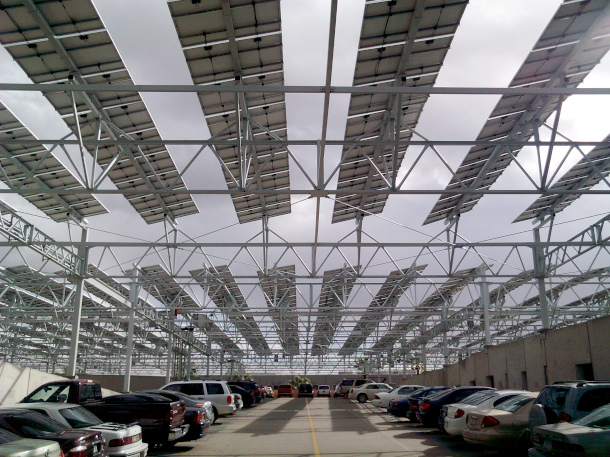
Experts say building new renewable energy infrastructure and transitioning to a clean energy economy under the Climate Crisis Committee’ plan would create more than 500,000 new jobs. (Photo: Kevin Dooley, Flickr, CC BY 2.0)
CURWOOD: Democrat Kathy Castor is the Chair of the House Select Committee on the Climate Crisis and serves Florida's 14th district. Congresswoman, thanks so much for taking the time with us today.
CASTOR: Oh, thank you so much, Steve. And let's have another check-in on our, make sure we're working through this to-do list down the road.
Links
KQED | “Here’s What’s Inside House Democrats’ New Climate Plan”
Grist | “House Democrats finally have a goddamn climate plan”
Living on Earth wants to hear from you!
Living on Earth
62 Calef Highway, Suite 212
Lee, NH 03861
Telephone: 617-287-4121
E-mail: comments@loe.org
Newsletter [Click here]
Donate to Living on Earth!
Living on Earth is an independent media program and relies entirely on contributions from listeners and institutions supporting public service. Please donate now to preserve an independent environmental voice.
NewsletterLiving on Earth offers a weekly delivery of the show's rundown to your mailbox. Sign up for our newsletter today!
 Sailors For The Sea: Be the change you want to sea.
Sailors For The Sea: Be the change you want to sea.
 The Grantham Foundation for the Protection of the Environment: Committed to protecting and improving the health of the global environment.
The Grantham Foundation for the Protection of the Environment: Committed to protecting and improving the health of the global environment.
 Contribute to Living on Earth and receive, as our gift to you, an archival print of one of Mark Seth Lender's extraordinary wildlife photographs. Follow the link to see Mark's current collection of photographs.
Contribute to Living on Earth and receive, as our gift to you, an archival print of one of Mark Seth Lender's extraordinary wildlife photographs. Follow the link to see Mark's current collection of photographs.
 Buy a signed copy of Mark Seth Lender's book Smeagull the Seagull & support Living on Earth
Buy a signed copy of Mark Seth Lender's book Smeagull the Seagull & support Living on Earth

